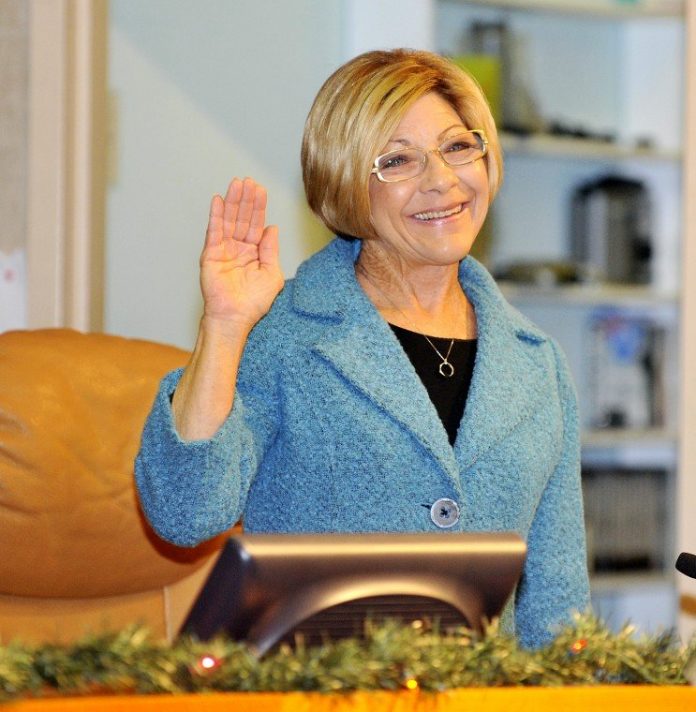During Monday night’s regular City Council meeting, members agreed to take a hard look at cutting down legal costs to the City, extended a temporary moratorium for check cashing and payday lending businesses and continued closed session negotiations with unions representing city employees and firefighters.
Woodward holds pricey legal fees in contempt
A $597,000 bill from the city’s contract law firm, Berliner Cohen, for 2011-12 makes Mayor Pro Tempore Perry Woodward sure the Council is being lackadaisical when it comes to cutting down on legal costs. After a contentious debate, Council voted 5-2 to form a subcommittee to direct staff as they work on a cost analysis model for an in-house attorney. Mayor Don Gage and Councilman Peter Arellano cast the dissenting votes.
Gage voted no because he doesn’t think one retained attorney will have the capacity to serve the City as it encounters an array of varying issues that require legal guidance.
Arellano voted no because City staff had already previously studied this issue.
But Woodward is unhappy with the fact Council members have “become very comfortable with this model,” he said, referring to the agreement with Berliner Cohen that arranges for the firm to handle all of the City’s legal affairs. “We need to think about watching every penny.”
In front of a stone-faced City Attorney Linda Callon, who works for Berliner Cohen, Woodward continued to dismantle an agreement he sees as a “built-in conflict of interest.”
“I’m not suggesting we hire a legal department,” Woodward remarked. “We just need one person.”
Gage attempted to placate Woodward, pointing to the difficulty of finding an individual with all of the requisite skills along with beating Berliner Cohen’s commitment to keeping costs low for the City.
“You’re going to end up spending a lot more than you see here,” Gage said, pointing to staff’s breakdown of legal costs from 2005 to today.
As Woodward’s argument started to gain traction among members of the dais, Council members Dion Bracco and Terri Aulman saw the wisdom in asking staff for a more detailed analysis of how much it will cost to hire a single lawyer to handle the City’s affairs, versus retaining an entire firm.
“I think it’s prudent to take a hard look at things from a business point of view,” Aulman added.
As the idea of a sub-committee began to take shape, Callon defended Berliner Cohen’s pricing structure.
“We believe that you are getting a good bargain,” she stated. “There has been no increase in rates for four to five years.”
Woodward remained resolute in his desire to take a much closer look at the money flowing out of Council coffers into Berliner Cohen’s pockets. Two previous efforts to provide an accurate assessment of the costs for legal alternatives by staff were unsatisfactory, Woodward added.
“I’m here to tell you that the staff report is not true,” he maintained. “The last report was biased.”
City Administrator Tom Haglund leapt to the defense of staff as Woodward’s statement floated above the dais.
“I disagree with your statement,” Haglund asserted.
Arellano also questioned Woodward’s assertions.
“If you can’t believe (City staff) about the lawyers, then you can’t trust them about anything else,” Arellano remarked. “If you feel that way, we better start looking for another staff.”
Council members on the as-yet un-named subcommittee include Woodward, Leroe-Muñoz and Aulman.
Payday lending and check cashing businesses safe from City’s wrath – for now
In a unanimous 7-0 vote, Council agreed to extend the temporary moratorium (a legally authorized period of delay) on the establishment, expansion or relocation of payday lending and check cashing businesses in Gilroy. Monday’s vote gives City staff an additional 10 months and 15 days to figure out whether those types of businesses have a future in Gilroy or not, and to write a permanent ordinance that reflects that.
The vote was met with opposition, however, as a procession of representatives from local payday lending and check cashing businesses trotted up to the public speaker’s lectern and made their case.
“The City shouldn’t be forcing out companies that provide well-paying jobs in Gilroy,” pleaded Irene Pena of Advance America, which is located on Church Street.
But Councilwoman Cat Tucker was quick to point out: in the meantime, at least, the moratorium “doesn’t do anything to existing (check cashing and payday lending) businesses,” she clarified. “I thought you’d be happy at us stopping your competition.”
Recommended funding for nonprofits delights and disappoints
Council received a report complied by City staff and the Citizens Advisory Committee recommending the 2013-14 funding levels for 11 local community outreach organizations.
CAC member Patty Pena called the process – which doles out up to $289,000 from Gilroy’s Community Development Block Grant and Housing Trust Fund – “tough decision making.”
Some agencies got the full amount they requested, while others such as the Gilroy Streets Team, which operates under the auspices of St. Joseph’s Family Center did not. They asked for $45,000 but received $35,500.
Executive Director David Cox with St. Joseph’s Family Center was pleased that the CAC recommended to council that St. Joseph’s receives the full $45,000 it requested for its employment services.
The nodes are coming
Council unanimously approved a right of way use agreement with NewPath Network, LLC, a telecommunications firm from New Jersey. The agreement allows NewPath to use existing utility poles around the city for installation of wireless telecommunications facilities. The antenna nodes will expand 4G and LTE service for Gilroy. Additionally, NewPath will compensate the City $1,000 per year for each light pole that is used.
Councilman Peter Arellano was concerned about what would happen if NewPath ceased to exist or the technology became obsolete.
“Is there anything in the contract about taking them (the nodes) down?” he cautioned.
City Transportation Engineer Henry Servin allayed Arellano’s fears over the 17 dome-like fixtures that will sit atop light poles.
“There is a discussion as to how they (nodes) would be removed or how they would revert to the City,” Servin explained. “They have to tidy up after themselves if they (NewPath) no longer exist.”
G-fest organizers will make Christmas Hill Park a little more festive
In a no-brainer unanimous vote, Council approved the Gilroy Garlic Festival’s request to undertake improvements worth $235,000 at Christmas Hill Park. Executive Director Brian Bowe outlined the association’s plan to plant 21 new mature trees near the baseball field on the Ranch side, and to revitalize the Mulberry picnic area, which has “become a little run down over the years,” Bowe said.
The picnic area work will include re-doing the tops of the pergolas, taking out old railroad ties and putting down a new compacted surface, among other things.
“We’re going to really spruce up that whole picnic area,” Bowe promised. “It’ll be much nicer for public enjoyment all year long.”
The beautification project, funded entirely by the Garlic Festival Association, will be completed before this year’s Garlic Festival in July, Bowe said.
Closed session negotiations
Collective bargaining units representing City employees and Gilroy’s firefighters continued negotiations with City Administrator Tom Haglund and Human Resources Director LeeAnn McPhillips over wages, hours, benefits and working conditions.
The next scheduled City Council meeting will take place at 6 p.m. May 6 in the Council Chambers located at 7351 Rosanna St.













